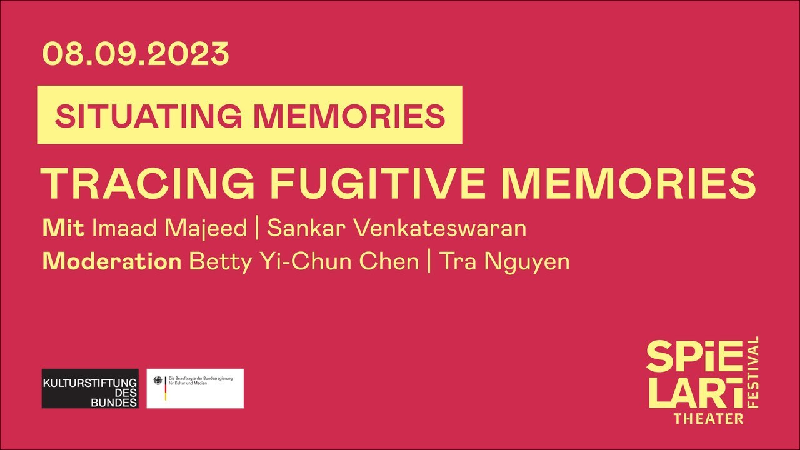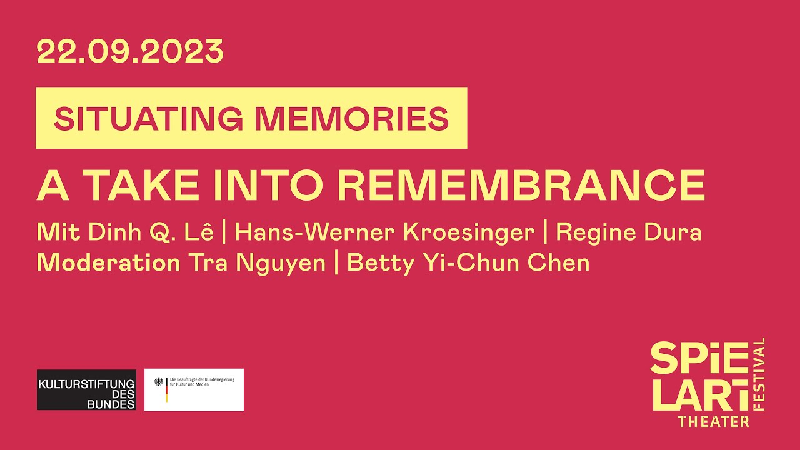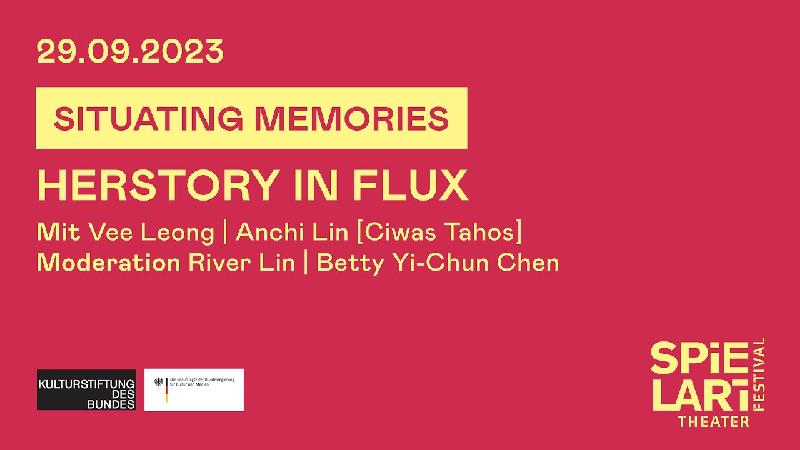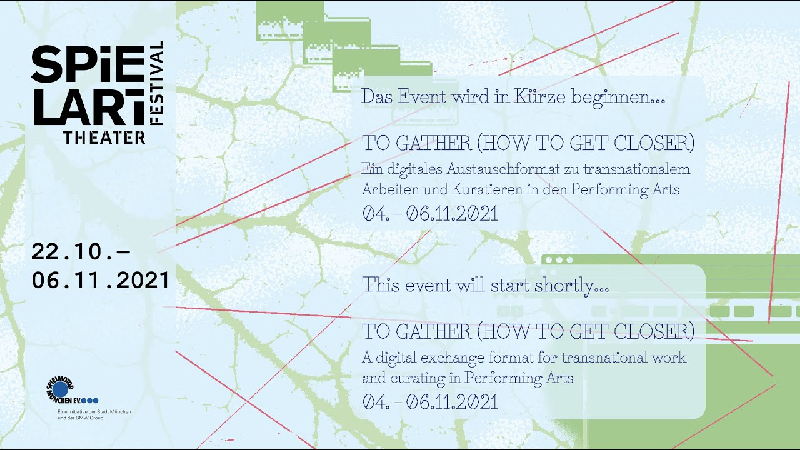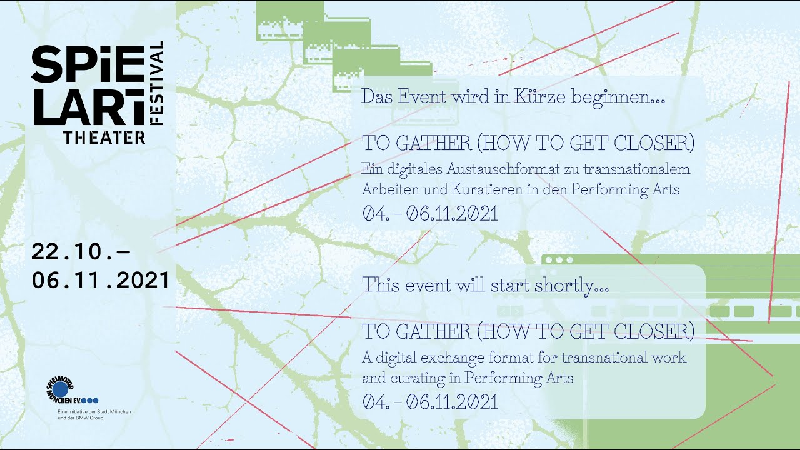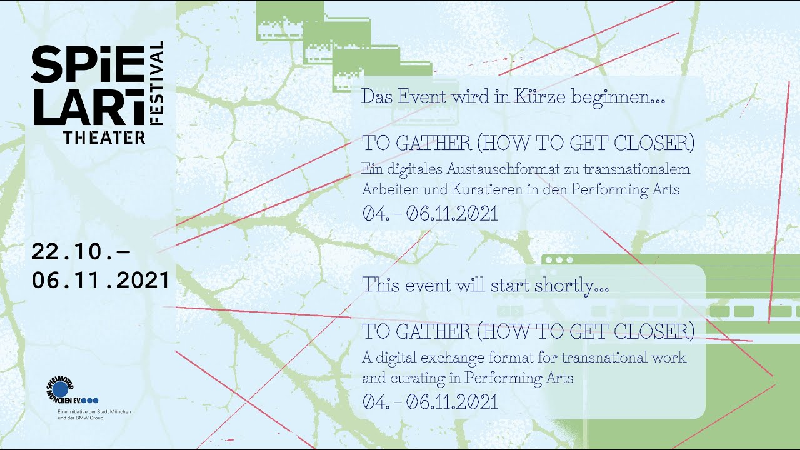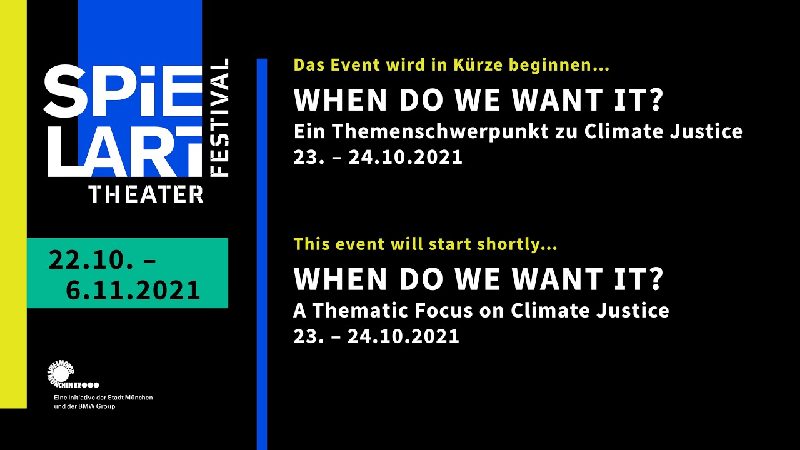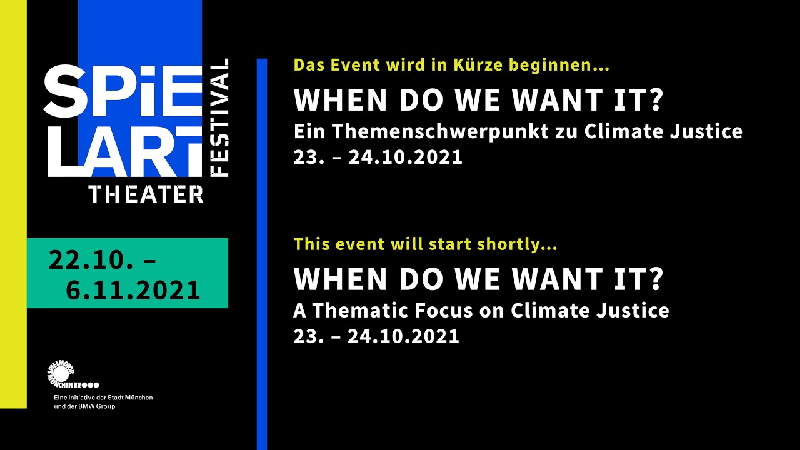Media library
A Digital Exchange Format for Transnational Perspectives in Art and Memory Work
SITUATING MEMORIES
MAKING ART IN A SHARED WORLD
Memories, like artworks, are embedded in their specific contexts and are never easily “universal”. Decentralized narratives and exchanges of heterogeneous contexts are therefore essential, to challenge the dominant stories in one’s one surroundings but also to discover new connections and potential for solidarity across borders. This online discourse series is part of the program focus WHEN MEMORIES MEET and expands discussions across different regions. Diverse artists are invited to share their strategies and insight in dealing with memory and remembrance. The series is a platform to make memories meet, and reflect on art practices in a global context.
The discourse format was developed by Betty Yi-Chun Chen, together with Trà Nguyễn and River Lin.
The programme WHEN MEMORIES MEET is funded by the German Federal Cultural Foundation. Funded by the Federal Government Commissioner for Culture and the Media.
SITUATING MEMORIES – TALK #1
TRACING FUGITIVE MEMORIES
Recording from 08.09.2023
Artist talk via Zoom
With Imaad Majeed | Sankar Venkateswaran Moderation Betty Yi-Chun Chen | Trà Nguyễn
How do significant conflicts in history impact individual lives and identities? How can we recount these fugitive memories that are neglected or silenced? Director Sankar Venkateswaran joins his Sri Lankan and Indian colleagues to probe into the legacy of the civil war in the northeast of Sri Lanka and its multifaceted repercussions to their Tamil identity, while artist Imaad Majeed excavates testimonies of the Tamil families of enforced disappearance during the same war, as well as those of the Sinhalese dissidents, the majority ethnic group that the Sri Lanka government claims to represent, whose enforced disappearance during an insurrection in the south of the country in the 1980s remained unaccounted for. Crossing ethnic and national borders, we engage in a dialogue on fugitive memories that bring to light heritage beyond national and ethnic borders.
SITUATING MEMORIES – TALK #2
A TAKE INTO REMEMBRANCE
Recording from 19.09.2023
Artist talk live & via Zoom
With Dinh Q. Lê | Hans-Werner Kroesinger | Regine Dura Moderation Trà Nguyễn | Betty Yi-Chun Chen
Understanding histories has never been as straightforward as reading a page, or looking at an artifact. It is a concept as flux as our own memories, evolving along with the interpretation of our everyday life. Theater-makers Hans-Werner Kroesinger and Regine Dura have addressed pressing social issues with historically-informed performances for many years. The work of visual artist, Dinh Q. Lê, based in Saigon, Vietnam, persistently challenges the popularizing affect of history, specifically that of the American-Vietnam war. A rare encounter that shows how a deeper understanding of history is possible in tandem with memory.
The talk took place live in Hồ Chí Minh City, Vietnam on 19.09.2023
SITUATING MEMORIES – TALK #3
HERSTORY IN FLUX
Recording from 29.09.2023
Artist talk via Zoom
With Vee Leong und Anchi Lin [Ciwas Tahos] Moderation River Lin | Betty Yi-Chun Chen
Recorded memories make up only a small part of experiences and tend to homogenize different threads of narratives. Memories that have not been articulated or heard, once disclosed, destabilise the traditional anchors of identity like ocean tides that embrace hybridity and volatility. Vee Leong follows traces of a mourning elephant in her feminist historiography, while Anchi Lin [Ciwas Tahos] captures, in the plight of bees, the intricate relationships between natural ecology and queer bodies. With the two artists, we explore the space where selfhood is expanded by reverberations from memories, nature and mythology.
A digital exchange format for transnational work and curating in performing arts
TO GATHER (HOW TO GET CLOSER)
The pandemic has become a catalyst in many areas of life within our societies, exacerbating inequalities or rendering them even more apparent. That also holds true for the performing arts: while artists from the Global North could largely rely on state support, stopping production was often not an option for artists from the Global South, with scarcely any options of funding aid from local institutions. What forms of collaboration remain – or first emerge – when the pandemic makes artistic production and presentations across borders difficult or impossible? How can spaces for encounters and exchange be established? What possibilities does the internet offer as a global space?
SPIELART has taken place hybrid 2021. Below you will find the recordings of the three-day digital discourse format TO GATHER with artist talks and film screenings.
TO GATHER (HOW TO GET CLOSER) Day 1
Recording from 04.11.2021
GHOSTING: Film screening with following artist talk via Zoom
IMAGINE A THEATER: Artist talk via Zoom
GHOSTING
This term refers to completely breaking off contact and communication out of the blue. When theatres in Germany were closed in November 2020 and travelling became impossible, the performance group Monster Truck, choreographer Segun Adefila and the seven performers from the Lagos-based children’s theatre group Footprints of David decided to relocate to the internet. GHOSTING is a film about being together and being abandoned, about digital bad consciences, teenage conflict avoidance and transcontinental power games. Film screening will be followed by a talk with Sahar Rahimi, Segun Adefila and Oluwaseun Awobajo, moderated by Julian Warner.
IMAGINE A THEATER – A panel on local-global art spaces
Seeking an artistic practice that is integrated into life rather than isolated from it, Sankar Venkateswaran and Satoko Tsurudome built a theatre in the remote jungle of Attappadi. They work there with their neighbours from various indigenous and migrant communities. After studying in the USA, Elisabeth Efua Sutherland returned to Accra (Ghana) to found the Terra Alta theatre and a community programme aimed at children designed to convey Ghanaian heritage. A conversation about artistic positioning between the local sphere and the global context, moderated by Virginie Dupray.
TO GATHER (HOW TO GET CLOSER) Day 2
Recording from 05.11.2021
WHERE IS THE INTERNET LOCATED?: Artist talk via Zoom
FESTIVALS AS GLOBAL SPACES: Artist talk via Zoom
MOVING WITHOUT BODIES: Artist talk via Zoom
WHERE IS THE INTERNET LOCATED? – A panel on performances in the digital realm
In MANILA ZOO, Eisa Jocson presents artists performing at home while the audience watches a live stream in the theatre. Bubblegum Club are developing a ZOOM performance, Mallika Taneja is curating REST OF THE STRUGGLE, a project running for a number of weeks on various digital channels. A conversation moderated by Silvia Bauer.
FESTIVALS AS GLOBAL SPACES – A conversation with three artistic directors
Where and how do theatre festivals position themselves, and why? Eva Neklyaeva, co-curator of the SPIELART Theatre Festival, interviews three artistic directors, Jeff Khan, Daniel Blanga Gubbay and Ron Berry, about their curatorial approaches.
MOVING WITHOUT BODIES – A panel on how concepts and ideas travel
Kris Nelson, art director of LIFT in London, introduces “concept touring”, which involves ideas travelling. Silvia Bottiroli addresses prototyping and the question of how a work can be developed across continents and yet for a specific local audience. In “Priority Mail”, Lindiwe Matshikiza and Mwenya Kabwe have developed a project involving various artists from the African continent that explores the historical reasons for the dearth of exchanges between Anglophone and Francophone regions. Moderated by Rucera Seethal.
TO GATHER (HOW TO GET CLOSER) Day 3
Recording from 06.11.2021
CREATING ECOSYSTEMS: Artist talk via Zoom
CREATING ECOSYSTEMS – A panel on mentorship programs
Two mentor projects are showing works-in-progress as part of NEW FREQUENCIES during the concluding days of the festival. With Maabara Exchange Theatre, author and performer Ogutu Muraya has founded a writing workshop in Nairobi. Beirut-based Zoukak Company has initiated 4 mentoring projects in the past two years alone. Ogutu Muraya and Omar Abi Azar talk about their motivations, experiences and how their work influences local cultural scenes, moderated by Martine Dennewald.
–––––––––––––––––––––––––––––––––––––––––––––––
A Thematic Focus on Climate Justice
WHEN DO WE WANT IT?
The impacts of the climate crisis are unevenly distributed around the world. Questions of climate justice are always linked to those of climate fragility: In regions already severely affected by climate change, the climatic and ecological crisis leads to additional political, social and economic vulnerabilities. Following on from Taigué Ahmed's dance piece THE DRYING PRAYER on the climate crisis at Lake Chad, talks, workshops and artistic positions explored how and under what conditions the performing arts can stand up for climate justice.
SPIELART has taken place hybrid 2021. Below you will find the recordings of the two-day digital discourse format WHEN DO WE WANT IT? with lectures, artist talks and film screenings.
WHEN DO WE WANT IT? Day 1
Recording from 23.10.2021
IDEAS TO POSTPONE THE END OF THE WORLD: Lecture
CLIMATE DANCES: Film-screening
DANCING SPIRITS IN THE ANTHROPOCENE: Lecture
IDEAS TO POSTPONE THE END OF THE WORLD – An Urgent Call for Climate Justice
Ailton Krenak is one of the most important political activists of the indigenous movement in Brasil. In his keynote for the thematic focus on climate justice he describes the perspective of the indigenous Krenak people on the climatic changes in the Amazone region and analyses in which respect the fight against climate change is linked to a global responsibility.
CLIMATIC DANCES
Just as DANZA Y FRONTERA, the dance piece by Amanda Piña, CLIMATIC DANCES is part of the long term project ENDANGERED HUMAN MOVEMENTS, dedicated to dances and cultural practices that have already vanished or are threatened with extinction.
DANCING SPIRITS IN THE ANTHROPOCENE – Indigenous dances in Mexico as cosmopolitical ecologies and living technologies
In his lecture, Alessandro Questa describes how certain traditional dances enable people to recognise each other. In recent years, various extractive industries, combined with the local consequences of global climate change, have had serious consequences for the Mexican mountain region of Puebla. The drastic changes have led indigenous Masewal farmers to re-establish traditional dances as a technological resource to save land and settlements from destruction. Followed by a conversation with Amanda Piña.
WHEN DO WE WANT IT? Day 2
Recording from 24.10.2021
WHAT FORM CAN AN ATONEMENT TAKE?: Film-screening, lecture and talk via Zoom
CLIMATE COLONIALISM OR CLIMATE REPERATIONS: Lecture and talk via Zoom
THE RIVER IS ME: Film-screening
REBELLIOUS RESISTANCE: Poetry reading
WHAT FORM CAN AN ATONEMENT TAKE?
In the Skolt Sámi region on the Finnish-Russian border, water became scarce due to government measures to divert river beds. The ecological damage has drastically reduced fish occurrences and climate change is intensifying the consequences of the interventions in the ecosystem. Artist and activist Pauliina Feodoroff has documented the renaturation of waterways and the conversion of past interventions in nature and shows the struggle of the indigenous population against the deteriorating living conditions. Film screening and lecture, followed by a discussion moderated by Eva Neklyaeva.
CLIMATE COLONIALISM OR CLIMATE REPERATIONS
As climate crisis intensifies, our political responses could reentrench existing political inequalities. But the reparative approach called for by activists and thinkers across the world has the potential to change the world at scale, meeting the challenges posed by climate crisis by addressing the racial inequalities that formed our current political world and led to the climate crisis. This talk will discuss the possibilities and dangers of the coming era, and some potential opportunities for changing course. Lecture followed by a discussion with Molemo Moiloa (Johannesburg).
THE RIVER IS ME
For many years, the ownership of the Whanganui River in New Zealand was under dispute between the Kiwi government and the Maori people, who consider the river sacred. Now, however, it owns itself. Filmmaker David Freid traces the Whanganui River’s legal as well as spiritual nature and explores what can and what cannot be determined by the law.
REBELLIOUS RESISTANCE - A Poetry Reading
Naomi Ortiz (about the Arizona U.S./Mexico border area), read by Erwin Aljukic.

